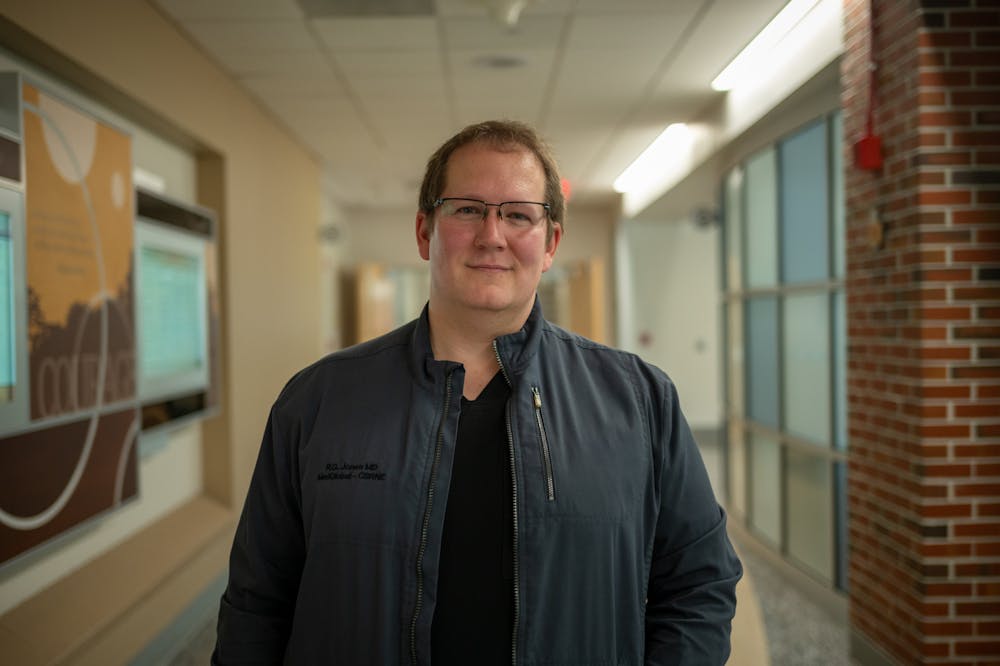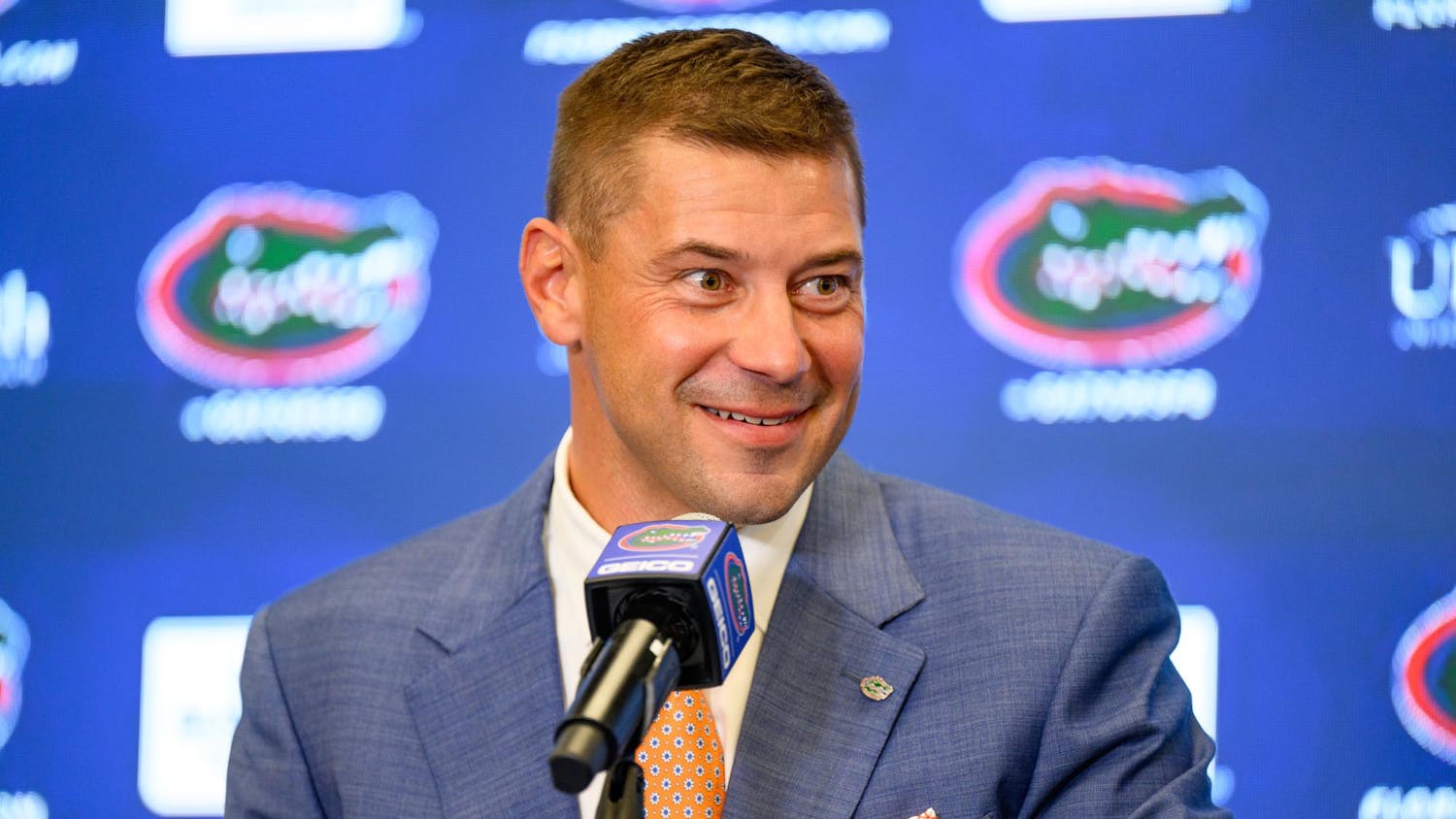Dr. Riley Jones kept a running tally of community service hours in a pocket spiral notebook starting in high school. His goal was to complete 10,000 hours of community service, which he accomplished last year.
Community service is fundamental to the 41-year-old UF assistant professor of medicine. The day before 9/11, Jones was worried about applying to colleges. After the planes hit the Twin Towers, half of his high school class joined the military. He knew he had to do something to help, but he felt the military wouldn’t be his best option.
He decided to dedicate his life to community service.
“I wanted to be an expert in trying to make the world better,” Jones said.
He started simple with roadside cleanups and tutoring. He began learning languages like French and Spanish.
The scale of his service projects would only grow once Jones got to college.
Jones earned his bachelor’s degree at Western Kentucky University, where his roommate asked him to accompany him to Haiti as a translator. Once he arrived, he was taken aback by the amount of poverty.
He needed to determine his long-term goals. He still wanted to make the world a better place, but it was easier said than done. He had learned of conditions about the world that he found intolerable, he said. Medicine was his answer to do something about it.
Jones was accepted into the University of Louisville for medical school. He then decided to return to Haiti for a couple weeks after the 2010 earthquake that devastated the country.
The airport was closed, so the plane landed on a strip of road. Doctors had to operate on kitchen tables where his team had eaten breakfast. The homes made of tarp stayed upright after the earthquake while whole buildings collapsed.
“The re-entry syndrome that you get when you fly back into Miami, and there's all these beautifully manicured lawns, and not an hour and a half before that, there's just destitution everywhere,” he said.
It didn’t stop him from traveling to Ecuador, the Dominican Republic, Peru, Venezuela and Ghana to continue his work in global medicine.
After medical school, Jones completed a master’s degree at King's College in London, where he studied post-conflict healthcare reconstruction after civil wars. He eventually started at UF thanks to a global health fellowship program in 2018. After the COVID-19 pandemic, he decided to stay in Florida and become a full-time attendant.
During a visit to Venezuela, he started working with MedGlobal, a non-governmental organization providing emergency response and support to victims of war and disaster, marginalized communities and refugees around the world.
Through MedGlobal, Jones gets to apply his expertise to see what the organization can offer during times of crisis. In 2021, a few days after the Russian invasion of Ukraine, he received a call. There was word that the Russian military would equip chemical weapons against the Ukranians.
Three days after the call, he purchased a plane ticket to Ukraine. A week later, he crossed into Ukraine in the pitch-black night and arrived in Lviv. He met with representatives from the government under constant air raids.
“We’re not there to talk military strategy,” he said. “You’ve got a civilian workforce that doesn’t know what to do. They’ve never seen a chemical weapon.”
Everything had to be done quickly. In a Zoom call with 350 people, Jones and the MedGlobal team broke down how to treat chemical attacks — like chlorine attacks — while also taking note of what healthcare workers need.
“It's just like good old-fashioned medical school,” Jones said.
They used PowerPoints and research to identify different nerve agents and how to treat them. The instruction consisted of hands-on training on the decontamination process so healthcare workers wouldn’t get themselves hurt or killed when trying to help victims.
He adopted a train-the-trainer model so the information could be passed down to different doctors and healthcare workers as quickly as possible. MedGlobal archived information using QR codes to make their resources even more accessible.
“You prepare them as much as you can for personal resiliency and how to keep your head down and keep moving forward,” he said.
The chemical attacks are brutal. The most common chemical weapon used has been chloropicrin, a chemical usually used as a soil fumigant that is a choking agent when used as a chemical weapon.
According to Jones, the Russian military would launch canisters with chloropicrin into Ukrainian frontlines. It would burn soldiers’ skin and deteriorate the rubber on their gas masks. They would wait for Ukrainian troops to come up gasping for air and then attack them.
During his three visits to Ukraine, Jones adjusted to the sound of the air raid sirens. His priorities were different. On a typical trip abroad, he’d expect to worry about where the closest coffee shop is. There, he had to take note of the closest place to hide. He spent time in old Soviet bunkers where there was only room to stand and huddle.
The Russian invasion of Ukraine was a land and power grab, Jones said.
“With this conflict,” he said, “we have seen a systematic drawback of all those humanitarian and international relations achievements.”
The way war is fought was challenged for the worst in the Ukrainian conflict, Jones said.
“We knew that this was going to be big and it was going to be long,” he said. “I fully believe that Ukraine will fight to the very last person.”
Jones found Ukraine beautiful. The culture was vibrant, even as the war continues.
“These are good, normal people,” he said. “There's a nightlife, there's an economy, there's some amazing artists.”
While the war has been devastating, he’s glad the world is recognizing Ukraine’s rich history and the importance of keeping it alive.
He’s found a greater lesson from the depths of the bunkers and between each visit to Ukraine. He called it the “return of death.” You die once biologically, then you die a second time the last time someone whispers your name.
Ukraine won’t experience its first death, not with the perseverance he’s seen in the Ukrainian people. The country won’t experience a second death, either, because even with the war, its history won’t be lost anytime soon.
He mentors medical students often and emphasizes the importance of what impact they can make on the world.
Dr. Zaher Sahloul, the co-founder and president of MedGlobal, was also in Ukraine alongside Jones. He’s been five times since 2021.
Sahloul was motivated to create MedGlobal after working in Syria between 2011 and 2016. He wanted to apply what he learned at the global level.
Sahloul first interacted with Jones when he volunteered with MedGlobal in Colombia, providing healthcare access to Venezuelan migrants and Colombian host communities near the border of the two countries. He noticed Jones’ commitment and eventually invited him to join MedGlobal’s board of directors.
“He’s [Jones] very methodological,” Sahloul said. “He likes to help.”
There were seven physicians and humanitarians on the first team sent to Ukraine a week after the war started. Sahloul worked alongside Jones to gather the information to instruct healthcare workers on chemical attacks, also referencing his experience in Syria.
Sahloul wants to give driven doctors like Jones a platform for activism. He’s seen people go to war zones to convert others to a religion, to get an adrenaline rush or to brag. He wants more people like Jones who are committed to the mission of helping communities.
“War and disasters are the enemies of health,” he said. “Our mission is to improve access to healthcare in disaster areas, to reduce healthcare inequities.”
Dr. Nila Radhakrishnan, the division chief and professor for hospital medicine, has been at UF College of Medicine since 2011. She oversees a team of 68 faculty members and the care of 200 to 250 inpatients.
When she took over the division of hospital medicine, she interviewed Jones for a global health fellowship through UF, a program that no longer exists after the pandemic. After his fellowship was completed, Jones stayed on as a faculty member.
“He certainly has always been a superstar,” Radhakrishnan said. “I was struck and continued to be impressed by his sense of purpose.”
She values his strong work ethic and his sense of purpose, something that is reflected in how he cares for his patients at Shands Hospital. Jones has helped publish research and innovations UF developed during the pandemic so other centers could benefit from UF’s research.
“What I have learned from Dr. Jones and others is it’s very important not just to go in, do some work and then leave,” she said.
Contact Delia Rose Sauer at drosesauer@alligator.org. Follow her on X @_delia_rose_.
Delia Rose Sauer is a journalism senior and the Summer 2025 Editor-in-Chief. She reported on the university desk for two semesters. When she's not glued to her laptop, she's drawing on Procreate, crocheting or creating a new Spotify playlist.






